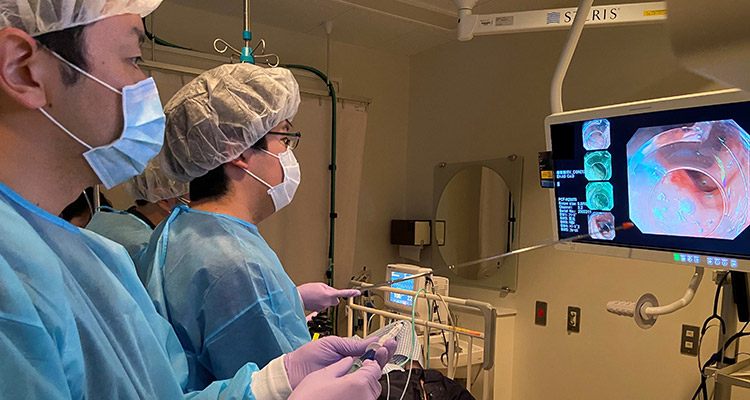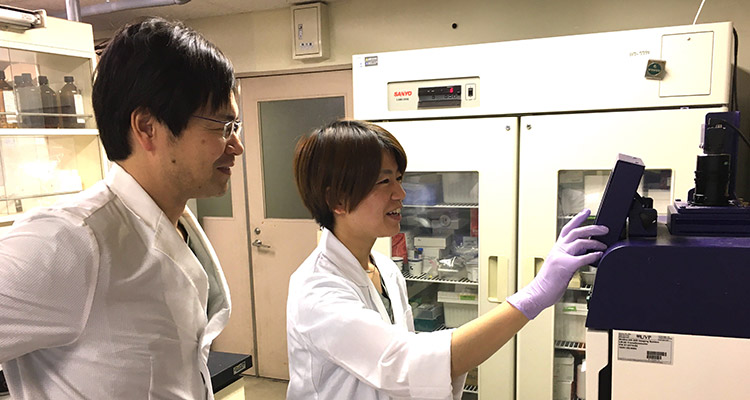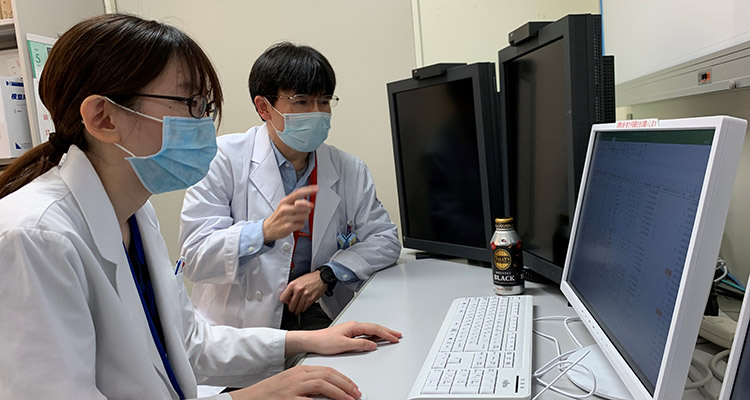大学院説明会
特設ウェブサイト
- トップ
- インタビュー
- 正宗 淳
リサーチマインドは医師としての考え方、
生き方の基盤世界を舞台に、
専門医に加えて医学博士号の取得を
目指してみませんか
- Research mindset is a way of thinking and living as a physician-
In the world of basic sciences,
why don't you seek a PhD in addition to a clinical specialty?
- 医科学専攻
- Medical Sciences
- 消化器病態学分野 教授
- Division of Gastroenterology Professor
- 正宗 淳
- Atsushi Masamune
- 2020.06.04
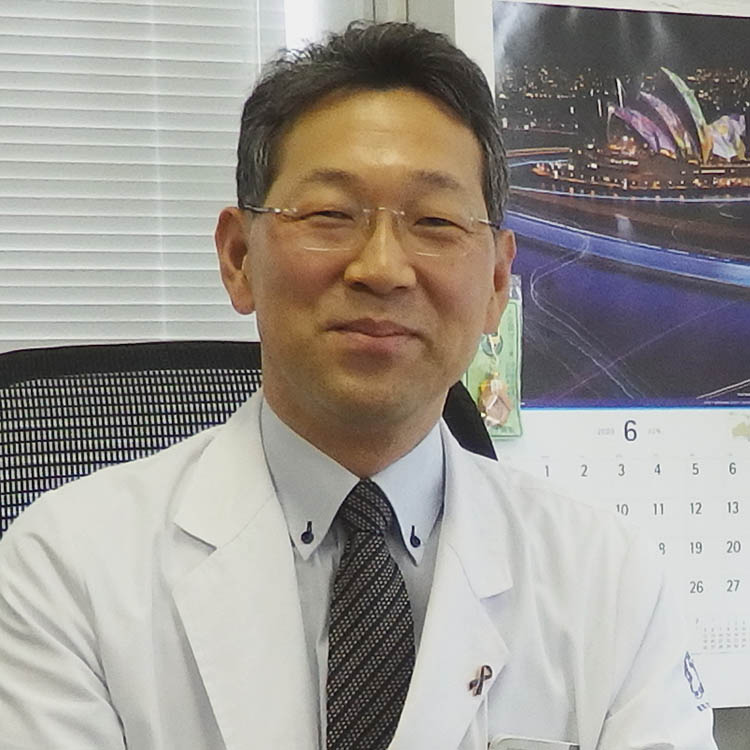
High volume centerの臨床教室として
As a clinical department in The High Volume Center
●研究の概要を教えてください
私どもは消化器病の患者さんに研究成果を還元することを目標に、①遺伝子解析を基盤とした研究、②ビッグデータをはじめとする臨床情報、臨床検体を用いた新規診断・治療法の開発、③内視鏡検体など患者さんの検体からのオルガノイド作製、培養細胞・モデル動物による病態解明・治療法開発、④超高齢社会において、より安全性が高く、侵襲の少ない新規内視鏡治療法や関連機器の開発、の4つを主要な研究テーマとして取り組んでいます。最近の成果として、次世代シークエンサーを用いた網羅的解析により、膵炎の新しい感受性遺伝子としてカルシウムチャネルTRPV6を世界で初めて同定した(プレスリリース1)ほか、遺伝子多型に基づくチオプリン製剤使用時の副作用発現リスク診断法を開発し、すでに保険収載されています(プレスリリース2)。さらに、膵炎全国疫学調査による膵炎診療の実態解明や、超高齢化社会における“体にやさしい”消化器病診療を念頭とした、早期胃がん内視鏡治療後の出血予測システムの開発などの成果をあげています。High volume centerの臨床教室であることを最大限に活用し、臨床検体、臨床データを用いた研究が多いこと、学内外、国内外の施設との共同研究が多いという特徴があります。
●What is your reseach summary?
With the aim of returning the outcomes of our research to patients with gastroenterological diseases, we are working on following major research themes: (1) research based on genetic analysis, (2) development of new diagnostic and therapeutic methods using clinical information such as big data and clinical specimens, (3) elucidation of pathogenesis and development of therapies using organoids created from patient specimens such as endoscopic ones, cultured cells and model animals, and (4) development of new endoscopic treatments and related equipment with higher safety and less invasion for an aging society.
Recent achievements include the identification of the calcium channel TRPV6 as a new susceptibility gene for pancreatitis for the first time in the world through a comprehensive analysis using a next-generation sequencer (press release 1), and the development of a diagnostic method to detect the risk of adverse effects when using thiopurine drugs based on genetic polymorphisms, which has already been covered by insurance (press release 2).
Furthermore, we have achieved to clarify the actual status of pancreatitis treatment through a nationwide epidemiological survey and develop a system for predicting bleeding after early gastric cancer endoscopy treatment with a view to providing “health-friendly” treatment for patients with gastrointestinal diseases in a super-aging society.
Our department takes full advantage of the fact that we are a clinical department in The High Volume Center, which allows us to conduct a lot of research using clinical specimens and clinical data, and to conduct a lot of collaborative research with internal and external, national and international institutions.
press release1.
若年性膵炎の新しい原因遺伝子を発見 -カルシウムチャネルが膵臓を守る-
press release2.
世界初の体外診断用医薬品の開発成功につながるチオプリン製剤の重篤な副作用を予測する日本人に最も適切な遺伝的マーカーを同定
press release3.
体に優しい手術をより安全に -早期胃がんに対する内視鏡治療後の出血予測モデルを開発-
若手・女性の割合が多く、風通しのよさが特徴
A large proportion of young people and females in an open culture.
●研究室はどのような雰囲気ですか?
70人近いメンバーがいる大きな研究室ですが、平均年齢は36歳と、主に医学部卒業後5年目以降に入局してくる教室としては若く、出身大学も様々です。消化器内科の診療には内視鏡手技の習得と後進への指導が不可欠であることから、研究においても後進を指導することが好きな、指導が上手なメンバーが多いと思います。診療グループは上部消化管、下部消化管、胆膵、肝臓と4つに分かれていますが、グループ間の垣根は低く、複数のグループが共同で行う研究も増え、風通しの良い教室です。消化器内科は診療が忙しいイメージですが、教室全体として働き方改革にも取り組んでいます。私自身が産業医活動をしており、東北大学病院働き方改革ワーキンググループのメンバーです。そのためか、私が教室を担当させていただいてから女性メンバーが増えてきており、現在は大学院生のうち女性が2割を占めます。研究の内容も臨床研究から細胞やマウスを用いた基礎研究まで、各メンバーの興味や得意分野、ライフスタイルにあわせて幅広く行っています。
●What is the atmosphere in your department?
Although we are a large department with nearly 70 members, the average age of our members is 36 years old, which is quite young for a department that mainly accepts new members after the fifth year of medical school graduation, and our members come from various universities. Since mastering endoscopic techniques and instructing younger generations are essential to the practice of gastroenterology, I believe that many of our members are good at guiding younger members in research as well.
Although there are four practice groups – upper gastrointestinal tract, lower gastrointestinal tract, biliopancreatic, and liver – the barriers between the groups are low, and the number of research groups collaborating on research is increasing, so there is good openness in the department.
The Division of Gastroenterology has an image of being busy, but we are also tackling “Reform of work practices” in our department. In fact, I am an occupational physician myself and a member of the Tohoku University Hospital Working Group on “Working Practices Reform”. Perhaps because of this, the number of female members has been increasing since I took charge of the department, and now 20% of the graduate students are females.
We are conducting a wide range of research, from clinical research to basic research using cells and mice, according to each member’s interests, fields of expertise and lifestyle.
世界を舞台に”うれしい“と思える体験を
Having Experiences that make you happy on the world stage
●学生にどのようなことを期待しているかなども含め、進学希望者へのメッセージをお願いします
私どもは消化器病の患者さんに研究成果を還元する、すなわち患者さんのためになる研究を目標としています。学位よりも専門医取得を重視する傾向にある現代でこそ、大学院生として疑問点や問題点を探求するリサーチマインドの育成は、その後の医師としての考え方、生き方の基盤となります。専門医または医学博士号という選択肢ではなく、専門医に加えて医学博士号を取得することを目指してみませんか。大学院生活でしか味わえないこと、それは世界を実感できることです。国際学会をはじめ世界で発表することができる、自分の書いた論文を世界中の研究者に読んでもらえる、まさに、世界が舞台です。自らすすんで、新しいことに興味をもって挑戦してくれることや、自ら提案して研究を展開する姿勢に期待しています。そして、できたら、成功体験をしてほしいと思っています。良い研究成果が出たり、論文がアクセプトされたり、学会で高い評価を受けたり、賞をとったり、”うれしい“と思える体験をしてほしいのです。そのために私どもは全力でバックアップします。
●What is your message to prospective students, including what you expect from them?
Our goal is to give back to patients with gastroenterological diseases through research that benefits them. Today, when people tend to value the obtaining of a medical specialist more than PhD, the development of a research mindset that explores questions and problems as a graduate student will become the bedrock of the way of your thinking and living as a doctor.
Instead of the choice of a medical specialist or PhD, why not pursue a medical degree in addition to your specialty? What you can experience only in graduate school is to feel the world. You will be able to present your work at international conferences and other international meetings, and your papers will be read by researchers around the world, so you are truly on the world stage.
We expect you to take the initiative and challenge yourself to try new things with interest, and to be willing to propose and develop your own research, and if possible, I hope that you will be able to have a successful experience.
I want you to experience the joy brought by good research results, acceptance of papers, high praise at conferences, and awards. We will give you all the support you need to achieve this goal.
●修了後はどのような進路がありますか?また、修了生はどのように活躍していますか?
私どもの教室では、後期研修を修了後や専攻医5年目に大学院への入学をしてきます。このため、大学院修了後は、消化器内科医、特に自分の専門領域のスペシャリストとして市中病院の臨床現場に戻る方が多いと思います。当科の関連病院は基幹病院が中心で、数多くの研修医がいます。リサーチマインドを持った指導医として、診療のみならず後進の指導に活躍しています。一方、修了後も引き続き、あるいは一度市中病院に勤務をしたのち大学に戻り、さらに研究や診療のレベルアップや海外留学を目指すメンバーも少なくありません。
●What career paths are available after I completed the program? What are the graduates doing well?
In our department, students join the graduate program after completing their training program for a medical specialist or in the fifth year of their medical specialist.
As a result, many of them tend to return to clinical practice in hospitals as gastroenterologists, especially as experts in their own specialty, after completing graduate school. The department’s affiliated hospitals are mainly core hospitals and have a large number of younger residents. Our graduates are active not only in medical practice but also in guiding younger residents as attending doctors with a research mindset.
On the other hand, there are not a few members who continue to study or return to the university after working at a hospital to further improve their research and practice, or to study abroad.
●病院や企業に勤務しながらの修学は可能でしょうか?
可能です。現在、大学院1年生のうち7名が東北大学病院のフルタイム医員として雇用され診療を行いながら、研究を始めています。
●Is it possible to study while working at a hospital or in a company?
It is possible. At present, seven of the first-year graduate students are doing research while employed as full-time physicians at Tohoku University Hospital.
門戸開放で多様性が尊重される研究環境
A research environment where diversity is respected through an open-door policy
●東北大学の良いところは?
研究第一主義を理念として掲げていることもあって、研究者の養成が積極的に行われ、それをサポートする体制や、学内の連携体制などが十分に確立されています。人材が豊富で、世界トップクラスの研究を行っている研究者も多数在籍し、そのような方々と連携し共同研究などを進めることで、より質の高い研究を行うことができます。共同実験施設をはじめとした充実した研究設備が整い、研究環境としても申し分ありません。一方、門戸開放も理念であり、さまざまな多様性を大学として大切にしている点も良いと思います。互いの多様性を尊重しながら補い合い、各人の得意分野を伸ばしていくような大学と言えます。そして、何より先輩方が100年以上にわたり築き上げてこられた歴史と伝統は、国内外における東北大学のプレゼンスを大変高いものとしています。東北大学の一員であるということに、誇りを持っていただけるかと思います。
●What are the advantages of Tohoku University?
As part of our research-first philosophy, we actively foster researchers, and we have a well-established system of support and collaboration within the university. The university has a wealth of human resources, and many of its researchers are among the world’s top-ranked, and through collaboration with them, we are able to conduct higher quality research.
The university is also well-equipped with a full range of research facilities, including a joint experimental facility, and has an excellent research environment. On the other hand, openness is also a philosophy, and I think it’s good that the university values diversity. We can say that our university respects the diversity of its students while complementing each other and developing their individual strengths. Above all, the history and traditions that our predecessors have built up over more than 100 years have given Tohoku University a strong presence at both national and international levels. I am sure that you will be proud to be a member of Tohoku University.
一流誌に掲載されるような研究は、ふとした偶然や幸運が重なって完成すると思っています。先頃、発表をした世界初の膵炎感受性遺伝子の同定は、遠方の病院から紹介されてきた患者さんが東北地方出身で、ご両親も来院していただけたおかげでトリオ解析ができたことが始まりでした。ドイツの研究者とは、プラハ空港の手荷物検査場で偶然一緒になり、ちょっとビールを飲まないかと声をかけられたことで共同研究が始まりました(写真)。機能解析をどこに頼んだらよいかわからず途方に暮れていた時に、この分野のエキスパートである京都大学の先生から、私どもが所有する膵がんモデルマウスの供与を依頼するメールが突然舞い込みました。そして、論文のリバイスにノックアウトマウスを用いた実験が要求された時には、共同研究者のすぐ近くの研究室がマウスを持っていました。本当に幸運、そして不思議なご縁の賜物でした。でも、このようなことはなかなかありません。気づかないうちに目の前を通り過ぎてしまっていることがほとんどなのでしょう。
I believe that research, which is published in top journals, is accomplished by a combination of chance and good luck.The identification of the world's first pancreatitis susceptibility gene, which I recently presented, had started with a patient who was referred to me from a distant hospital. He happened to be from the Tohoku region and his parents also visited the hospital, so we were able to perform a trio of analyses, which led to the identification of the susceptibility gene.
My joint research with a German researcher began when I happened to be with him at the baggage checkpoint at Prague airport and was invited to have a beer with him (see photo).
In addition, when I was at a loss as to where to contact for functional analysis, I received an email out of the blue from a professor at Kyoto University, an expert in this field, requesting that we provide him with our pancreatic cancer model mice.
Furthermore, when a knockout mouse experiment was requested for the revision of the paper, a lab just around the corner from my collaborator had that mouse.
It was truly a blessing of good fortune, and a strange match.
However, this kind of thing doesn't happen very often. Most of the time, it might have passed in front of us without notice.
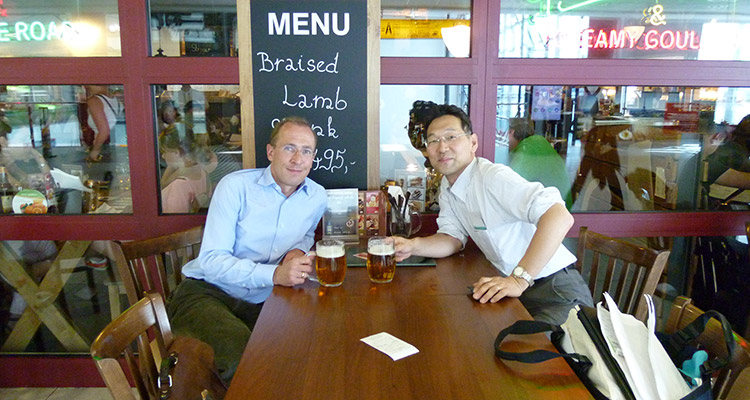
- PROFILE
- 医科学専攻
- Medical Sciences
- 消化器病態学分野 教授
- Division of Gastroenterology Professor
- 正宗 淳
- Atsushi Masamune
1990年東北大学医学部卒業、福島県厚生連白河厚生総合病院にて研修。1992年東北大学大学院医学系研究科入学、在学中にワシントン大学病態生物学教室留学。1996年大学院修了、大蔵省(現:財務省)仙台国税局診療所内科医師。1999年に帰局し東北大学医学部付属病院第3内科助手。同助教、院内講師、准教授を経て、 2018年東北大学大学院医学系研究科消化器病態学分野分野教授。2019年東北大学医学系研究科長特別補佐、東北大学病院消化器内視鏡センター長。
In 1990, graduated from Tohoku University School of Medicine, and interned at the Fukushima-ken Koseiren Shirakawa Koseisougou Hospital. In 1992, he entered the Tohoku University Graduate School of Medicine and studied at the Department of Pathobiology at the University of Washington. Completed graduate studies at Tohoku University Graduate School of Medicine in 1996, and became a doctor of internal medicine at the Sendai Regional Taxation Bureau of the Ministry of Finance. Returned to Tohoku University Hospital in 1999 to work as an assistant professor at the Third Department of Internal Medicine. After serving as an assistant professor, lecturer and associate professor at the same hospital, he was appointed as a professor at the Division of Gastroenterology, Tohoku University Graduate School of Medicine in 2018. In 2019, he became a special deputy to the Dean of Tohoku University Graduate School of Medicine and Director of the Gastrointestinal Endoscopy Center, Tohoku University Hospital.
●関連リンク
manager*gastroente.med.tohoku.ac.jp (「*」を「@」に変換してください。Please convert "*" to "@")
